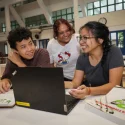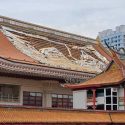Nguyen Hong Gia Nghi from Phan Thiet initially applied for the ASEAN Merit undergraduate scholarship, which covers tuition, living expenses, housing and even funding for overseas exchange. But NUS went further, awarding her not only the undergraduate scholarship but also a full-tuition master’s scholarship from the university’s College of Design and Engineering, valid from 2028 to 2032.
“This joy is overwhelming,” Nghi said. “Beyond boosting my confidence, the scholarship relieves my family of financial burden.”
The path to this rare achievement began years earlier. In 2021, while still in grade 10 at Tran Hung Dao High School for the Gifted in Phan Thiet, Nghi won a secondary ASEAN scholarship that took her to Singapore’s Chinese Girls’ School. It was her first time living abroad, right during the height of the Covid-19 pandemic. Cut off from home and forced to spend a year in quarantine without returning to Vietnam, she relied on phone calls with family to ease her homesickness while sticking to a strict daily study schedule.
Her discipline paid off. She excelled in math, physics and geography, earning top 5% recognition on the principal’s list. She also won medals in national competitions, including gold in math and bronze in physics, before moving on to St Andrew’s Secondary School, where she was selected for the prestigious Nanyang Research Program.
Over eight months under the guidance of NTU professors, she explored energy transfer between semiconductors and rare earth elements to generate white light. The experience forced her to learn coding, data analysis and scientific writing from scratch. By the end, she had produced a full report and defended it before an academic panel, rare for a high school student.






